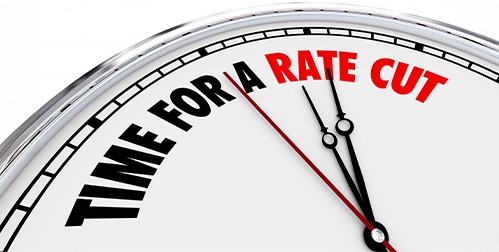The Fed Signals Cuts are Coming
“The time has come” for the Fed to reduce interest rates, said Jerome Powell, Federal Reserve Chair. “The direction of travel is clear.” And with that statement, the economy is set to begin a major pivot. The conclusion of one of the most aggressive interest rate cycles in financial history will definitely impact the economy. The question economists are debating now is how, and what individuals can do to brace for that impact. 1
Interest Rates to Date
Over the past 16 months, the Fed raised rates an unprecedented 11 times to control inflation. The Fed’s efforts to control on inflation were checked by massive government spending. But inflation has decreased from a record high of 9.1% to 2.9%. However, interest rates were held higher for longer until inflation was trending toward the Fed’s target of 2%. This approach made it more difficult for businesses and individuals to secure loans. It also raised mortgage rates and stalled the housing market.2
 3
3
Now, with the Fed signaling potential cuts, Powell stated, “The timing and pace of rate cuts will depend on incoming data, the evolving outlook, and the balance of risks.”4
Investors are currently pricing in a 25-basis point cut next month. According to the CME FedWatch tool, there is a smaller chance of a 50-basis point cut. Overall, markets anticipate a total of 100 basis points in cuts by the end of the year.
Interest Rates, Stocks, Gold & You
Despite the market excitement, a quarter-point reduction is unlikely to make a significant impact on a company’s loan repayment schedule. Mortgage rates will still be nearly triple what they were a few years ago.
It probably won’t be felt by individuals either. “Your credit card bill is not going to plunge the day after the next Fed meeting,” cautions LendingTree chief credit analyst Matt Schulz. “Nobody should expect miracles.”5
While these cuts are just the beginning, over time, they could have positive effects. They could lower loan costs and spur the housing market.
However, stocks have likely already factored in these cuts. Despite a recent rally after Powell’s statement, a significant surge is unlikely.
Traders should “be careful what you wish for” according to Liz Ann Sonders of Charles Schwab. Historically, the market doesn’t do so well after big policy reductions. In the 14 full Fed cycles in modern financial history, markets have fared worse when the Fed cut rates rapidly versus gradually.
“So you actually want a Fed that is eying the escalator down, not the elevator down,” she said.6
Traders may be baking in too many rate cuts – some expect eight cuts in the next eight meetings. That would only happen if the economy took a massive downturn. Stocks could be being set up for a major fall if all those cuts don’t materialize.
Meanwhile, gold prices have risen along with expectations for rate cuts. Gold recently surpassed $2,500 per ounce. It reached a new all-time high of $2,531. Investor sentiment and interest rate speculation appear to be the key drivers for gold right now. U.S. dollar weakness and a drop in Treasury yields have also helped boost prices.
Recession Warning
Garry Evans, Chief Strategist at BCA Research, warns that a recession is likely, even if interest rates come down. “There’s a very strong narrative in the market that we’re facing a soft landing. We don’t believe that. We see signs that the economy is turning down,” he said.7
Evans points to the labor market as a cause for concern. Revised jobs data shows that the U.S. added 818,000 fewer jobs between April 2023 and March 2024 than initially reported. Additionally, the unemployment rate has risen from 3.4% in April 2023 to 4.3% last month. That is the highest rate since October 2021.
Manufacturing activity has also fallen to its lowest level since November, and the global economic outlook is looking increasingly bleak.
Conclusion
The arrival of rate cuts has been anxiously anticipated for almost two years. For some, the easing of monetary policy means cheaper loans, faster growth, and higher stock prices. But all that waiting may have created unrealistic expectations. With a recession looming, economists advise caution over confidence. For the time being, assuming a defensive posture with safe haven asset can secure your portfolio as the impact of interest rate cuts is revealed. A Gold IRA can offer long-term financial security as the economy begins a new cycle. To learn more, contact us today at 800-462-0071.






